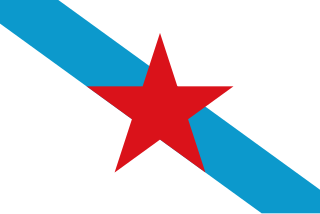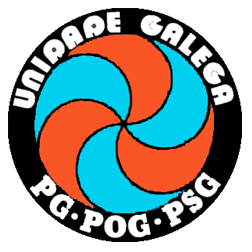Related Research Articles

The Galician Nationalist Bloc is a political party from Galicia, formed with the merger of a series of left-wing Galician nationalist parties. It is self-defined as a "patriotic front".
Galician Workers' Party was a political party in Galicia, Spain.
The Galician People's Union is a Galician nationalist and communist political party, and is one of the registered political parties of Spain. The party publishes the magazine Terra e Tempo, and the secretary general is Néstor Rego.

Galician nationalism is a form of nationalism found mostly in Galicia, which asserts that Galicians are a nation and that promotes the cultural unity of Galicians. The political movement referred to as modern Galician nationalism was born at the beginning of the twentieth century from the idea of Galicianism.

Galician Unity was a Galician nationalist and social democratic political coalition formed by the Galician Workers Party, Galician Socialist Party, and the Galicianist Party in 1979.

Renewal–Nationalist Brotherhood is a political party in Galicia. Formed in 2012, under the guidance of historical leader Xosé Manuel Beiras, Anova was formed by Encontro Irmandiño, the FPG, Movemento pola Base, the Galician Workers Front, and independents. Anova defines itself as a Galician nationalist, socialist, feminist, ecologist, internationalist organization and advocates for Galician independence. Its internal organization is run by assemblies.
The Assembly of the United People (APU) was a Galician political organization, with an independentist, socialist and feminist ideology. It was formed in 1989 from a split of the first Galician People's Front, and disappeared with its self-dissolution in 1995.

The Galician Movement for Socialism was a Galician communist, pro-independence and feminist organization. The MGS was born in March 2009, although its origins go back to the summer of 2006. The MGS works inside the Galician Nationalist Bloc and the Confederación Intersindical Galega.

The Galician National-Popular Bloc was a Galician electoral candidacy. It had as the national sovereignty for Galiza as its main objective and as an alternative to autonomism. It was formed by the Galician People's Union (UPG) and Galician National-Popular Assembly (ANPG).

The Galician Socialist Party was a socialist and Galician nationalist political party active in Galicia.

Commitment to Galicia is a Galician political party with a Galician nationalist, progressive ideology.
Abrente–Galician Democratic Left is a Galician political party formed in June 2012 as an internal current of the Galician Nationalist Bloc (BNG) with a Galician nationalist and social democratic ideology.

Acción Galega is a Galician political organization led by former the former member of the PP Rafael Cuíña, former Galician autonomic Minister Teresa Táboas and the former senator of the Galician Nationalist Bloc (BNG) Xosé Manuel Perez Bouza. The party was founded in 2012 through the union of several parties of centrist and moderate Galician nationalist ideology: the Partido Galeguista Demócrata, the Galician Nationalist Party-Galicianist Party, Terra Galega and Galician Coalition.
The Galician Nationalist Party–Galicianist Party was a Galician nationalist and liberal political party, coming from a split of the Galician Coalition. The PNG–PG had 132 members in 2002. Xosé Mosquera Casero was the last secretary general, after the VIII Congress in September 2011. The party merged with Commitment to Galicia in 2012.
Galician Nationalist Convergence was a political coalition and, later, a political party in Galicia formed by Galician Coalition and Centrists of Galicia. CNG presented lists to the local elections of 1991. After the 1991 elections Centrist of Galicia abandoned the coalition and entered the People's Party of Galicia. This, and the bad electoral results, caused a crisis in Galician Coalition, which led to the split of CNG in the provinces of Ourense and Lugo. CNG, now an independent party, presented lists in the local elections of 1995, gaining only the 0.59% of the vote. The disastrous results of the local elections of 1999 led to the dissolution of the party and the founding of Galician Initiative.

Galician Coalition is a political party in Galicia, Spain with a Galician nationalist and centrist ideology. Since 2012 CG is part of the coalition Compromiso por Galicia.

Revolutionary Communist League was a political party in Spain. It was founded in 1971 by members of the Catalan group Comunisme, a split of the Popular Liberation Front (FLP). The LCR had a trotskyist ideology, adopting more heterodox political positions in the 1980s.
Movemento pola Base is a Galician pro-independence and left-wing political organization. The MpB was born in the summer of 2006 from a group of militants of the Galician Nationalist Bloc (BNG), critical with the political line of the organization at the time.

Ensame Nacionalista Astur (ENA), was a political party in Asturias, Spain. ENA was an Asturian nationalist and socialist party.
The Canarian United People was a left-wing nationalist political coalition operating in the Canary Islands. The party aim was self-determination for the islands and socialism. It was a coalition between various political parties and groups, with a communist, pro-independence or nationalist ideology. The coalition received the support of the MPAIAC.
References
- ↑ Beramendi, Xusto and Núñez Seixas, O Nacionalismo Galego. Edicións A Nosa Terra, Vigo, 1995. (in Galician)
- ↑ "Archived copy" (PDF). Archived from the original (PDF) on 2014-08-01. Retrieved 2015-02-01.
{{cite web}}: CS1 maint: archived copy as title (link) - ↑ Manuel Anxo Fernández Baz, A formación do nacionalismo contemporáneo (1963-1984). Laiovento, Santiago de Compostela, 2003. (in Galician)
- ↑ Fernando Prieto Valdés y Alberto Romasanta Armesto: Oposición política al franquismo y exilio en Galicia: Estado de la cuestión. Espacio, Tiempo y Forma, S. V, Hª Contemporánea, t. IV, 1991, pages 117-138.
- ↑ "Fracaso general de los nacionalismos · ELPAÍS.com". Archived from the original on 2011-12-12. Retrieved 2015-02-01.
- ↑ Jesús de Juana López y Julio Prada Rodríguez: La dinámica política de la Galicia post-autonómica. Cuadernos de Historia Contemporánea, 2006, vol. 28, pages 323-342.
- ↑ "Consulta de resultados electorales. Ministerio del Interior". Archived from the original on 2015-05-22. Retrieved 2015-02-01.